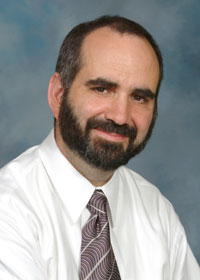 |
Howard Gendelman, M.D. |
“Hand in hand, linking lives for Parkinson’s” is the theme for the association’s first fundraiser, which will be held at the Bemis Contemporary Art Center. The evening will feature live and silent auctions, and a performance from the Chris Saub jazz band. Money raised that night will fund education, outreach and programs that support families of people with Parkinson’s disease (PD) throughout Nebraska.
“I am honored to receive this award on behalf of my team,” said Dr. Gendelman, who is chairman of pharmacology and experimental neuroscience, director of the Center for Neurovirology and Neurodegenerative Disorders, and the Larson Professor of Internal Medicine and Infectious Diseases.
His team includes R. Lee Mosley, Ph.D., assistant professor of pharmacology and experimental neuroscience; Michael Boska, Ph.D., professor of radiology; Ashley Reynolds, graduate student; and Eric Benner, M.D., Ph.D., former graduate student who is now at the University of North Carolina.
During the past decade, Dr. Gendelman’s team has developed an internationally renowned PD research program at UNMC. The research has focused on developing immunological means and vaccines to protect against the ravages of this disease and understanding the disease processes.
“We have substantively added to the base of knowledge that we now enjoy in understanding PD mechanisms,” he said.
Because his team’s expertise was previously focused on viral infections of the brain, it was difficult to procure federal monies, he said. It was donors in Nebraska who supported this work during the first few years.
|
It also is first state in the country to have a Parkinson’s registry, which is maintained by the Nebraska Department of Health and Human Services. The registry identifies people with the disease, tracks disease clusters and attempts to determine environmental triggers, such as pesticide runoff in well water, said Lisa Brovold, education coordinator for the American Parkinson Disease Association, Omaha branch, information and referral center. The four primary symptoms of PD are tremor, or trembling in hands, arms, legs, jaw, and face; rigidity, or stiffness of the limbs and trunk; bradykinesia, or slowness of movement; and postural instability, or impaired balance and coordination. |
“All of our scientists are deeply indebted to Francis and Louis Blumkin, Carol Swarts, Harriet Singer, Dennis and Lisa Lewis, among others, who have given graciously over the years to support this work,” Dr. Gendelman said.
Gendelman’s team has shown that the immune system within the brain, in particular the microglia, plays an important role in the pathogenesis of PD and is a cause of damage to specific nerve cells that govern movement and balance.
PD is the second most common neurodegenerative disorder among the elderly and is characterized by the progressive loss of dopamine-producing brain cells.
The successful marriage of neuroscience and immunology is what makes Dr. Gendelman’s approach unique to PD research and patient care, said Harris Gelbard, M.D., Ph.D., interim director of the Center for Neural Development and Disease and professor of neurology, pediatrics, and microbiology and immunology at the University of Rochester Medical Center in New York.
“There is a dysregulation of the normal communication between the nervous and immune systems that result in the destruction of nerve terminals responsible for releasing dopamine,” Dr. Gelbard said. “Howie’s research has made significant gains in understanding this mechanism.
“Howie is working to restore the balance of communication between the nerve and immune cells, which could mean a considerable advancement in therapy for these patients. His research is unique, timely and at the cutting-edge for neuroscience,” he said.
By concentrating on this specific niche in research, Dr. Gendelman and his team have made impressive strides in building a premier program in a matter of five or six years, said Serge Przedborski, M.D., Ph.D., the Page and William Black professor of neurology at Columbia University in New York. He also is the co-director of Columbia’s Center for Motor Neuron Biology and Disease.
“Dr. Gendelman was already a leader in neuron-inflammation research, particularly with HIV-AIDS, when he realized there were a number of common mechanisms that affect the brain with Parkinson’s disease,” he said. “His research has developed some promising strategies that are novel and extremely significant. We’re still a few years away from translating some of these discoveries to the bedside, but his research will have a far-reaching impact for patients.”
Dr. Przedborski said UNMC is fortunate to have Dr. Gendelman on the faculty.
“You’ve got an impressive researcher in your corner,” he said.